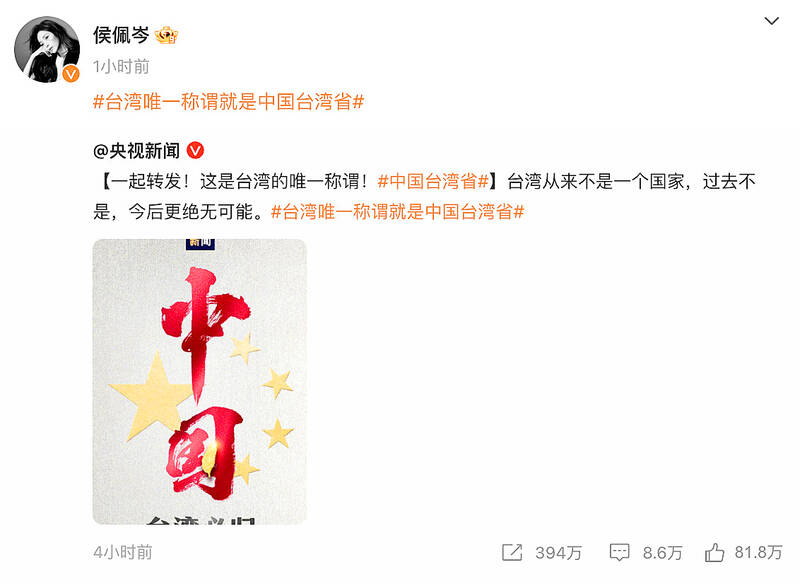The Mainland Affairs Council (MAC) late on Saturday night condemned the comments of Taiwanese entertainers who reposted Chinese statements denigrating Taiwan’s sovereignty.
The nation’s cross-strait affairs authority issued the statement after several Taiwanese entertainers, including Patty Hou (侯佩岑), Ouyang Nana (歐陽娜娜) and Michelle Chen (陳妍希), on Friday and Saturday shared on their respective Sina Weibo (微博) accounts a post by state broadcaster China Central Television.
The post showed an image of a map of Taiwan along with the five stars of the Chinese flag, and the message: “Taiwan is never a country. It never was and never will be.”

Photo: Taipei Times file photo
The post followed remarks by Chinese Minister of Foreign Affairs Wang Yi (王毅) on Friday that Taiwan has never been a country, “not in the past and never in the future,” adding that the only reference to Taiwan in the UN was as a “province of China.”
The MAC said that Taiwan is an independent, sovereign nation that has never been part of the People’s Republic of China (PRC).
“To protect their careers in China, some Taiwanese entertainers have echoed statements made by PRC officials to denigrate the nation’s sovereignty, seriously hurting the feelings of Taiwanese,” it said.

Photo: Screen grab from Patty Hou’s Sina Weibo account
“Taiwanese entertainers should not harm the land that cultivated them, allowing them to pursue careers in China,” it said. “We strictly condemn those who voluntarily act as a pawn as part of China’s united front work intended to destroy Taiwan.”
The MAC said would review the entertainers actions to determine if they contravened Article 33-1 of the Act Governing Relations Between the People of the Taiwan Area and the Mainland Area (兩岸人民關係條例), which prohibits “any cooperative activity of a political nature with any individual, juristic person, organization, or other institution of the Mainland Area.”
The council said that China seeks to control the entertainment business to censor artists or mobilize them to make political statements on behalf of the PRC.
The practice demonstrates the fundamental differences in the systems of governance across the Taiwan Strait, it said.
A government source familiar with cross-strait affairs, who spoke on the condition of anonymity, yesterday said that it was not the first time Taiwanese entertainers working in China have made pro-China statements, such as celebrating the PRC’s national day or stating that the two sides of the Strait are part of one family, a typical “united front” tactic.
However, the entertainers crossed a line and seriously affected the nation’s security and interests by agreeing with and amplifying Wang’s statement that the Republic of China is not a country and that cross-strait issues are China’s internal affairs — a Beijing tactic intended to deny Taiwan participation in international organizations and to prevent countries from intervening in a potential attack against Taiwan, they said.

ACTION PLAN: Taiwan would expand procurement from the US and encourage more companies to invest in the US to deepen bilateral cooperation, Lai said The government would not impose reciprocal tariffs in retaliation against US levies, President William Lai (賴清德) said yesterday, as he announced five strategies to address the issue, including pledging to increase Taiwanese companies’ investments in the US. Lai has in the past few days met with administrative and national security officials, as well as representatives from various industries, to explore countermeasures after US President Donald Trump on Wednesday last week announced a 32 percent duty on Taiwanese imports. In a video released yesterday evening, Lai said that Taiwan would not retaliate against the US with higher tariffs and Taiwanese companies’ commitments to

‘SPECIAL CHANNEL’: Taipei’s most important tasks are to stabilize industries affected by Trump’s trade tariffs and keep negotiations with Washington open, a source said National Security Council Secretary-General Joseph Wu (吳釗燮) arrived in the US for talks with US President Donald Trump’s administration, a source familiar with the matter said on Friday. Wu was leading a delegation for a meeting known as the “special channel,” the Financial Times reported earlier. It marked Trump’s first use of the channel since returning to the White House on Jan. 20. Citing a source familiar with the matter, the Financial Times reported that Minister of Foreign Affairs Lin Chia-lung (林佳龍) was also a part of the delegation. The visit came days after China concluded war games around Taiwan and amid Trump’s

CHIP EXCEPTION: An official said that an exception for Taiwanese semiconductors would have a limited effect, as most are packaged in third nations before being sold The Executive Yuan yesterday decried US President Donald Trump’s 32 percent tariff on Taiwanese goods announced hours earlier as “unfair,” saying it would lodge a representation with Washington. The Cabinet in a statement described the pledged US tariffs, expected to take effect on Wednesday next week, as “deeply unreasonable” and “highly regrettable.” Cabinet spokeswoman Michelle Lee (李慧芝) said that the government would “lodge a solemn representation” with the US Trade Representative and continue negotiating with Washington to “ensure the interests of our nation and industries.” Trump at a news conference in Washington on Wednesday announced a 10 percent baseline tariff on most goods

Intelligence agents have recorded 510,000 instances of “controversial information” being spread online by the Chinese Communist Party (CCP) so far this year, the National Security Bureau (NSB) said in a report yesterday, as it warned of artificial intelligence (AI) being employed to generate destabilizing misinformation. The bureau submitted a written report to the Legislative Yuan in preparation for National Security Bureau Director-General Tsai Ming-yen’s (蔡明彥) appearance before the Foreign Affairs and National Defense Committee today. The CCP has been using cognitive warfare to divide Taiwanese society by commenting on controversial issues such as Taiwan Semiconductor Manufacturing Co’s (TSMC, 台積電) investments in the